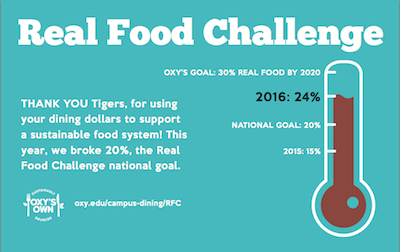
Based on the latest Real Food Challenge (RFC) audit, nearly one-quarter (24%) of Occidental College’s food purchases are now "real food"—double the amount just one year ago.
The RFC defines "real" food as edibles that are locally sourced, organic and humanely produced and meet a host of other criteria that "respect human dignity and health, animal welfare, social justice and environmental sustainability," according to the RFC.
The 24 percentage mark is made up of 5% food that meets at least two RFC criteria and 19% that meets one criteria.
"These are results to be proud of, and undoubtedly place us alongside schools like UC Santa Cruz and Warren Wilson in our commitment to supporting a sustainable food system," said Dylan Bruce ’16, who served as Campus Dining’s lead student intern for sustainability research and implementation for three years.
Oxy now uses Seafood Watch and Marine Stewardship Council-approved seafood (54% "real" seafood), humane and free-range poultry, cage-free eggs (52% "real" eggs), local and organic produce (30% "real" produce), 77% "real" coffee and tea from Groundwork Coffee and Café Vita and Rishi fair-trade organic teas and 22% "real" baked goods. (The Green Bean switched to local bakeries using organic ingredients this year.)
In addition, 20% of packaged goods are "real," and "nearly all new packaged goods introduced in the Marketplace, Tiger Cooler and Green Bean this year met RFC criteria," according to Amy Munoz, head of dining services.
"While we felt we were on the right track this year, just how much progress we made comes as a happy surprise," Munoz said. "The genesis of our success was more aggressive sourcing, but without positive response to new items and initiatives we cannot move forward. Thank you Oxy for voting with your dollars and choosing sustainable alternatives."
In October 2014, Occidental became the 27th national signatory to the Real Food Challenge Campus Commitment, with a goal of purchasing 30% sustainable food by the year 2020. Dining Services has been participating in the Real Food Challenge since 2008. In the 2015-2016 academic year the College focused on new procurement initiatives, the addition of new Real Food meals and marketing Real Food to the Oxy community to reach the 24% mark.
In the 2016-2017 year, the College plans to approach more local producers and persuade them to switch to organic ingredients and sustainable sources.
In addition, Oxy has set its own sustainable food goals to be met by 2020:
- 30% overall real food
- 20% humane animal products
- 50% ecologically sound seafood (goal was exceeded this year)
- 50% local/ecologically sound produce
- Reduce dependence on plastic water bottles and decrease usage to fewer than 50,000 bottles per year (currently at approximately 53,000/year).
- Purchase all coffee and chocolate from organic and/or fair-trade certified sources.
Students can support these goals by choosing items in the Marketplace tagged with the "Sustainable Sourced" logo, and by supporting these weekly sustainable meals: Thursday night Organic Bar, Wednesday night Organic Potato Bar, Monday and Friday SLO (Sustainable Local Organic) Lunches and Saturday Sustainable Smoothie Bar.
The Real Food Challenge is directed at colleges and universities to create a healthy, fair and green food system. These institutions spend almost $5 billion each year on food. "Because of concentration in the industry, even small changes in institutional food procurement can have powerful effects on farmers and the entire food chain," according to the RFC.
The RFC’s primary goal is to shift $1 billion of existing university food budgets (20%) away from industrial farms and junk food and toward local/community-based, fair, ecologically sound and humane food sources by 2020.
For more about Occidental's participation in the program and goals, click here.



